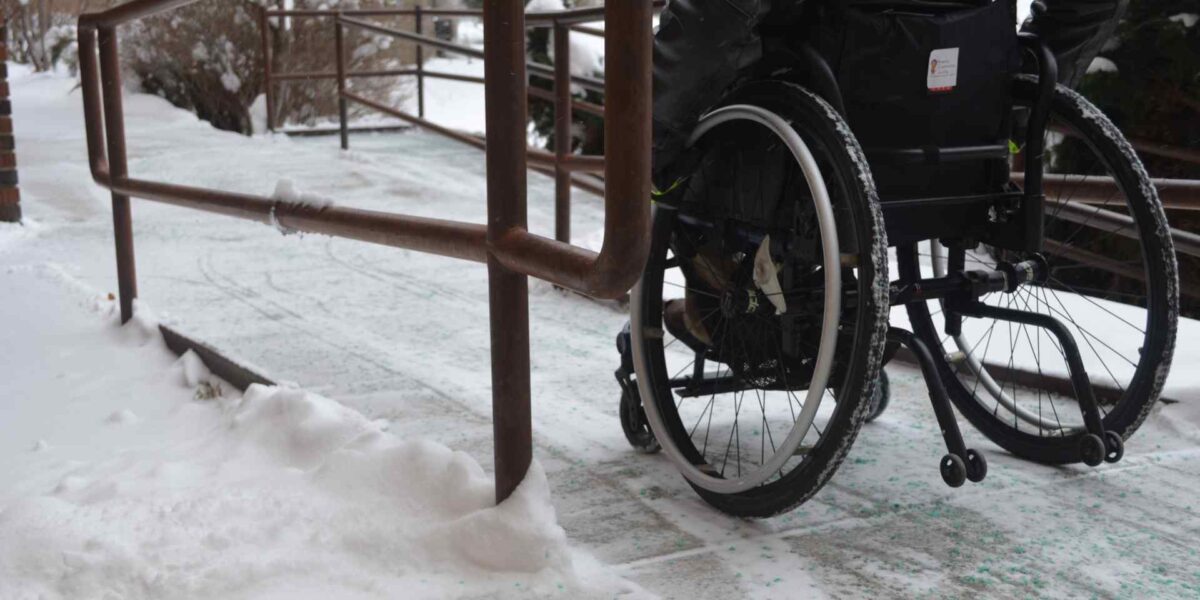It is a January afternoon in Winnipeg. Patrick Stewart and his colleague who uses a motorized wheelchair are waiting at a crowded bus stop in front of Portage Place Shopping Centre in downtown Winnipeg. A bus pulls up, the door opens.
The crowd is thick and a person in a wheelchair who has already boarded must roll off to allow other able-bodied passengers to board and then roll back on again. There is no room left for Patrick and his colleague.
They begin their long walk home down Portage Ave. The sidewalks are covered in snow. Patrick and his colleague use the diamond bus lane. He walks behind her to make sure they are visible in the rush hour traffic.
Nearly 175,000 people in Manitoba live with a disability, according to Barrier Free Manitoba. The Accessibility for Manitobans Act became law in 2013, but members of the accessibility advocacy community still face many of the same barriers today as before its enactment.
The Act lays out five, overarching standards meant to make every aspect of life more accessible for people living with a disability in this province.
These standards are, the accessible customer service standard, enacted in November of 2015, the accessible employment standard, enacted in May of 2019, the accessible information and communications standard, enacted in May of 2022, the accessible transportation standard, which will be enacted in January of 2027 and, the accessible design of outdoor public spaces standard for which no date of enactment has been set.
Until November of 2024, no one in the Manitoba government was specifically tasked with enforcing this act. Instead, enforcement relied on, “educating into compliance” according to the Accessibility Compliance Secretariat website.
The recent assignment of two enforcement officers will make advocating for accessibility easier, but “time will tell what actually comes out of all that,” said Melissa Graham, the Executive Director of the Manitoba League of Persons with Disabilities who lives with Cerebral Palsy and uses a wheelchair.
She believes the act is one of the most significant advances in accessibility Manitoba has seen, but it falls short of the federal standards which have meaningful enforcement.
Under the federal standard, Crown corporations are required to come up with robust, articulated accessibility plans and they can get into trouble for not updating them, according to Graham. This leaves non-Crown corporations and other entities without any binding accessibility legislation, only non-binding guidelines.
The problem with the provincial standards is that no one seems to know they exist. The only reason these standards exist is because disability is a protected status in every province, according to Graham.
“You’re not supposed to discriminate against people with disabilities! The problem was that people (the public) didn’t know what that meant, they didn’t realize that not making things accessible was an act of discrimination. That was the reasoning behind the standards,” Graham said.
Debby McLeod, Accessibility Coordinator at the Manitoba League of Persons with Disabilities and wheelchair user, believes the AMA was written with good intentions, “but good intentions don’t automatically make change. There must be consequences for people (businesses) who do not follow the law,” she said.
Part of McLeod’s job is to help clients file complaints with the Accessibility Compliance Secretariat and the ombudsman. McLeod believes the ideal solution to the accessibility enforcement issue would be to have a whole team of enforcers throughout the province who would check on accessibility complaints at specific addresses as soon as the secretariat receives them.
“The act is aspirational, it’s not a magic wand,” according to Patrick Stewart, a Community Outreach Consultant at the Independent Living Resource Centre in Winnipeg. “It doesn’t make anyone do anything; it doesn’t provide money for accommodations to be met. The real work in making sure that it makes the difference comes down to individuals, organizations, and individual political leaders,” he said.
In a five-year review of the AMA conducted by Karen Sharma, Executive Director of the Manitoba Human Rights Commission in 2023, she states, the AMA is legally binding, but the language used makes it confusing.
According to the review, many people find it confusing when the regulations in the AMA are referred to as standards. The word “standards” diminishes the legal weight of the AMA and gives the impression that it is just something to aspire to instead of a binding piece of legislation that’s being enforced.
Sharma says the language used in the Accessibility for Manitobans Act makes it difficult for people experiencing disabilities to understand what their rights are and for service providers to know their obligations. She bases her findings on the 2023 Manitoba Business Leaders Index which found only 17 per cent of surveyed businesses had an “excellent” understanding of the AMA.
The review also found the number of complaints of discrimination based on disability the Human Rights Commission received between 2012 and 2022 hadn’t changed significantly even with the enactment of the AMA. At the time the review was written, there were more than 41,000 organizations in Manitoba required to comply with the AMA legislation.
To be clear, accessibility advocates in Manitoba want the AMA to continue but the way individuals and businesses interact with people experiencing disabilities needs to change.
“It shouldn’t be up to the person with a disability to be the accessibility police! It shouldn’t be a complaint-based system where I have to complain every time I go through every aspect of my life to get the changes that I want,” said David Kron, Executive Director of the Cerebral Palsy Association of Manitoba.
Businesses should be proactive and deal with complaints as they receive them, according to Kron. Promotion and enforcement of the AMA is necessary so that in 25 years accessibility will be the normal way of life in the province of Manitoba.



